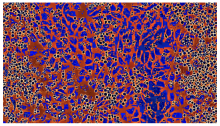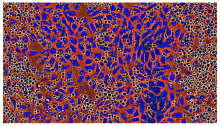

Three-Dimensional Gene Hubs May Promote Brain Cancer
April 22, 2025
The way DNA folds inside the nucleus of brain cells may hold the key to understanding a devastating form of brain cancer called glioblastoma, suggests a new preclinical study from Weill Cornell Medicine researchers.

New Strategy May Enable Cancer Monitoring from Blood Tests Alone
April 11, 2025
A new, error-corrected method for detecting cancer from blood samples is much more sensitive and accurate than prior methods and may be useful for monitoring disease status in patients following treatment, according to a study by Weill Cornell Medicine and New York Genome Center investigators. The method, based on whole-genome sequencing of DNA, also represents an important step toward the goal of routine blood test-based screening for early cancer detection.

EIPM's 1Q 2025 External Newsletter
April 3, 2025
EIPM's First Quarter 2025 External NewsletterMemo
March 31, 2025
Dear Friend of the Englander Institute for Precision Medicine,
Welcome to our first quarterly external newsletter of 2025!

April 2025 EIPM Director's Memo
April 3, 2025
April 2025 EIPM Director's Memo
Dear Friends & Members of the Englander Institute,

AI Meets Oncology: New Model Personalizes Bladder Cancer Treatment
March 30, 2025
Leveraging the power of AI and machine learning technologies, researchers at Weill Cornell Medicine developed a more effective model for predicting how patients with muscle-invasive bladder cancer will respond to chemotherapy. The model harnesses whole-slide tumor imaging and gene expression analyses in a way that outperforms previous models using a single data type.

EIPM Researcher Explores “Bioenergetic Age” link to Alzheimer’s
March 19, 2025
A person’s “bioenergetic age” – or how youthfully their cells generate energy – might be a key indicator of whether they’re at risk of developing Alzheimer’s disease, new research from Weill Cornell Medicine shows.
The study, published Feb. 24 in Nature Communications, suggests healthy living can turn back the bioenergetic clock for some people, helping them fend off Alzheimer’s as effectively as a new drug called lecanemab.

Lowering Bioenergetic Age May Help Fend Off Alzheimer’s
March 13, 2025
A person’s bioenergetic clock ticks forward based on genetics, but having a healthy lifestyle—such as eating a plant-based diet and exercising—may help keep Alzheimer's symptoms at bay. Credit: Shutterstock

‘Flipping’ switch boosts stem cell numbers for therapies
March 12, 2025
A single molecular switch is essential for blood stem cells to enter an activated, regenerative state in which they produce new blood cells, according to a preclinical study led by Weill Cornell Medicine investigators. The discovery could lead to more effective bone marrow transplants and gene therapies.


